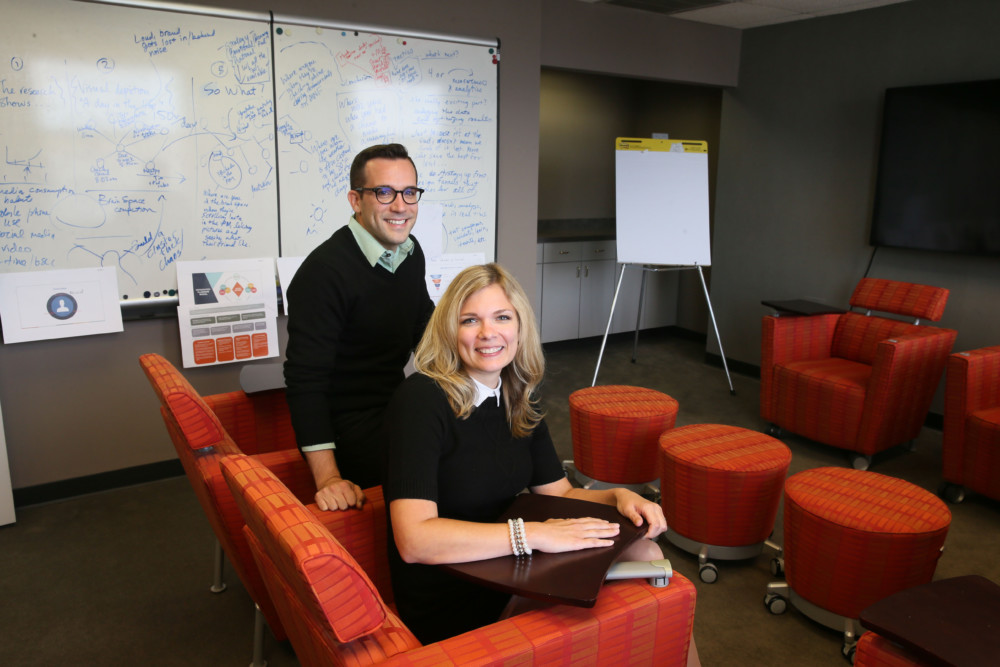Sarah Hauer
Milwaukee Journal Sentinel
WWR Article Summary (tl;dr) When applying for jobs, more millennials than baby boomers or gen-Xers responded that the “opportunity to learn and grow” and “opportunity for advancement” were “extremely important,” according to a Gallup poll.
MILWAUKEE
Amanda Janssen-Egan bounced around a couple Milwaukee advertising agencies after graduating from the University of Wisconsin at Oshkosh in 2005.
Janssen-Egan landed at Jigsaw as a media planner and buyer in 2010. She liked the work and the clients.
But she wanted to grow. To move forward in her career, she left Jigsaw after a year and a half. Janssen-Egan joined another Milwaukee agency, Laughlin Constable, where she also worked as a media planner and strategist.
Janssen-Egan said she wanted to return to Jigsaw. And she did.
Her bosses Steve Marsho and Steven Wold understood that she became a stronger asset to their team by leaving. After a little more than a year, she came back with new experiences and skills under her belt.
Janssen-Egan, 34, was promoted to junior partner at the firm last month, empowering her with more say in the firm’s decisions. One of her peers, Mike Luedke, 32, was also promoted to junior partner.
The way people think about structuring a career is changing. In most cases, it no longer makes sense to join a company as a 20-something and stay until retirement. The long-term incentives, such as pension plans, have ceased at many companies.
Different desires are driving how to navigate a career path.
When applying for jobs, more millennials than baby boomers or gen-Xers responded that the “opportunity to learn and grow” and “opportunity for advancement” were “extremely important,” according to a Gallup poll.
Those same interests affect retention, too.
Sydney Finkelstein, a professor of management and director of the Leadership Center at Dartmouth College’s business school, said he is often asked about how to deal with millennials in the workplace.
“There’s a lot of head scratching going on,” he said.
His response is “be a superboss,” which he defines as the leader who helps workers accomplish more than they ever thought possible. His latest book, “Superbosses: How Exceptional Leaders Master the Flow of Talent,” is based on a decade of research and more than 200 interviews.
He said the idea of superbosses resonates particularly with people under 35.
Why? Superbosses create master-apprentice relationships and spend a good chunk of each day interacting with their team. Superbosses give a seat at the table and space to be creative and innovate.
Importantly, they’re supportive of careers, even when a path takes employees away from the company.
From his perspective, hiring managers need to catch up and realize being a stepping stone job isn’t a bad thing.
“They’re shooting themselves in the foot with this approach,” Finkelstein said.
“Everything is changing in the world. It’s kind of obvious,” said Finkelstein, listing power players such as Uber and Amazon challenging traditional business. “Why would anyone think that there wouldn’t be disruption going on in how they think about their careers?”
Luedke, the director of strategy and junior partner at Jigsaw, never wanted to work for an advertising agency. Luedke said he “wanted to be in charge of his own destiny.” That started to change four years ago when he began to freelance for Jigsaw.
His work wasn’t one-dimensional, and there was always something new to learn. A little more than three years ago, Luedke joined the firm full time.
For Jigsaw partners Marsho and Wold, promoting two young employees was about more than having “token millennials” on their team. About 20 people work at the firm.
“The fact that they’re younger than us can add value in ways that’s important to the future of the agency,” Marsho said. “But it was really much more about performance.”
Marsho and Wold called the pair into an office conference room to propose the promotions, reworking their structure to accommodate the budding professionals. Every time Jigsaw was pitching new business, Marsho said he wanted Janssen-Egan and Luedke in the room.
Janssen-Egan and Luedke recognize how their age affects the way they’re able to craft advertising aimed at young people and their ability to sell it to clients.
“With the way we’ve grown up consuming media, it’s just different,” Luedke said. “It clashes with the ideas of consuming media and doing the work of advertising that some of the people who have been in this industry longer have come to experience over time.”
And, they said, every client is looking to reach people in their age bracket.
Luedke said he recently advised a client to invest in producing six- to 10-second videos to post as Instagram stories. He drew from his own experience from the social platform to make the pitch.
Janssen-Egan and Luedke said they feel valued at Jigsaw in a way they haven’t found at other jobs.
“Millennials aren’t newcomers to the office world anymore, and if you’re in a position where you’re thinking that you want more, want to do more, want to be challenged more, then raise your voice,” Luedke said. “There are people like the Stevens who have woken up.”














































































































































































































































































































































































